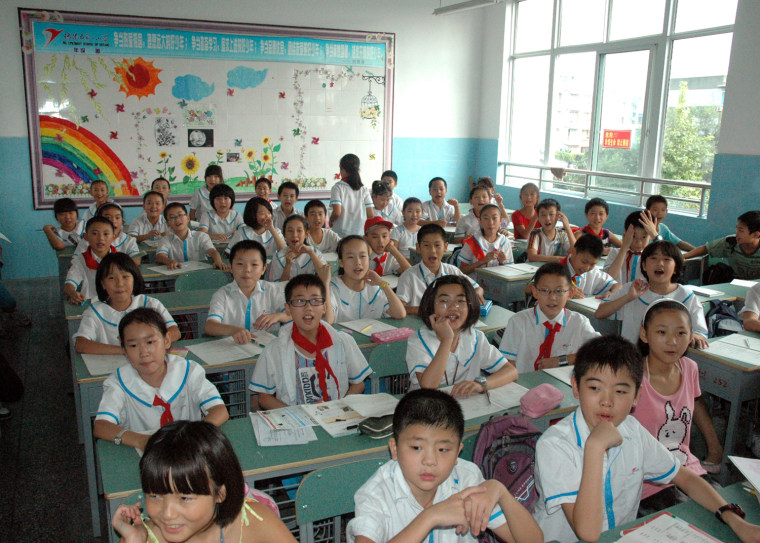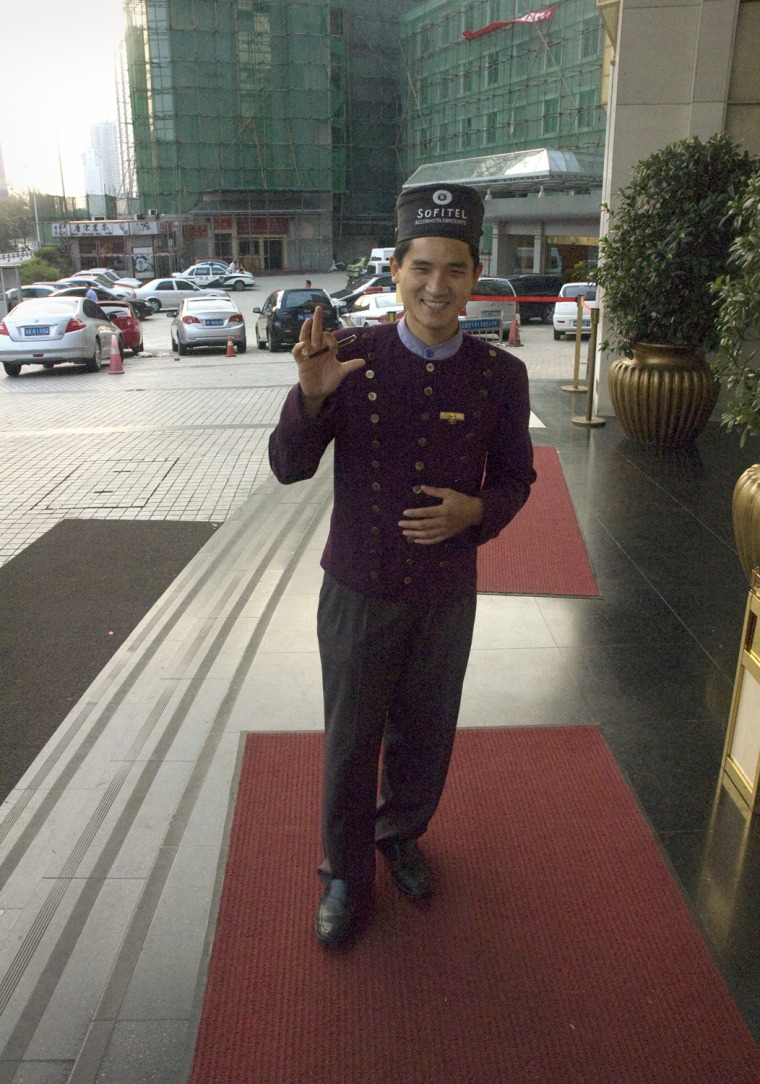Gong Da Dian had some great expectations when he came to this burgeoning city in southwestern China.
Four years ago, he left his family farm in a small town about 60 miles to the southwest, and took a job testing video games. It wasn’t long before he’d switched jobs.
“I was tired of looking at a computer screen all day long,” he said. “You worked overtime and they didn’t give you extra money. It’s not fair.”
Now he’s working as a bellhop at a downtown hotel overlooking the Funan River; the shiny brass nameplate on his uniform shows his English name, Dickens.
“But I can’t stay at the hotel,” he said between trips to the street to hail cabs for guests leaving the hotel. “I need to become smarter. I need to improve. I’ll go back to school, if I can get enough money.”
Creating a new generation of higher-skilled workers is both a means and an end for China’s ambitious development plan. With wages rising for low-skilled factory jobs, Chinese leaders say they need to expand the base of higher-paying jobs and create the highly trained work force needed to fill those jobs.
But as China overhauls its education system, it faces a big risk: What happens if the next generation learns to think too far outside the Communist Party's box?

Upgrading an education system to serve a continent-sized country of 1.3 billion people would be a monumental challenge under any circumstances. A big boost in spending has raised China's enrollment rate to 95 percent of primary school-aged children from 80 percent in 2001, according to a recent World Bank report.
But those "high average enrollment ratios masked inequality in access and quality” between prosperous urban areas and poor rural counties and villages, the report found. It added that “the problem was particularly marked in the western region.”
China’s leaders are also wrestling with a more fundamental problem. Some observers argue that the traditional Chinese approach to education doesn’t encourage the kind of independent thought that fosters innovation and risk taking.
"The education system rewards hard work and memorizing things," said K.C. Kwok, an economist at the University of Hong Kong. "They reward politeness and humbleness. If you want to critically challenge your teacher, that’s considered impolite. "
Not long ago, challenging the party line could be hazardous to your health. For the past 30 years, China has been rebuilding a higher education system that all but collapsed during the Cultural Revolution, when professors and researchers deemed disloyal to the Communist Party were banished to collective work farms.
Since former Chinese leader Deng Xiaoping's "opening up" reforms of the 1980s, rebuilding higher education also has meant opening up to Western styles of teaching and recruiting teachers trained in the West. Teachers with international experience are more open to students challenging their ideas, according to a student at the state-run University of International Business and Economics in Beijing, who did not give her name when she spoke at a recent meeting with U.S. journalists.
The move to overhaul China's education system to foster independent thinking and fresh ideas is critical to Beijing’s aspiration to develop world class “China brands” that attract the same kind of global demand that major western brands enjoy with Chinese consumers. The goal is to create products that are so innovative, well-designed or well-made that they can compete with foreign brands.
"China is looking to find that breakthrough — whether it’s in appliances or some other field — where they develop an international brand that when you hear the name, you think, 'China is really coming up,'" said Jim Thompson, head of a global shipping company based in Hong Kong. "It’s going to will take awhile but I think it will happen. They’re trying to get to that point.”
There are signs that China’s investment in higher education and research is paying off. China's global patent applications are growing five times more quickly than those of the U.S., and total patent volume is expected to top both the U.S. and Japan next year, according to a recent analysis by Thomson Reuters. Officials here proudly note that China publishes more papers in international journals than any country but the United States.
But the quality of some of those papers has been called into question. Last December, a British journal retracted 70 papers from a Chinese university, all by the same two scientists, saying the work had been fabricated.
"Academic fraud, misconduct and ethical violations are very common in China," professor Rao Yi, dean of the life sciences school at Peking University, told The Associated Press. "It is a big problem."
Opening China's higher education system to Western styles of teaching poses another risk to the ruling regime. Students exposed to teachers from the West may develop a taste for Western-style personal freedoms of thought and expression and could press for greater support for basic human rights and democratic rule of law. This month's awarding of the Nobel Peace prize to jailed Chinese dissident Liu Xiaobo has stepped up pressure on the Chinese government, which has resisted calls to match economic reform with a more open political system.
To maintain the current political order, China's leaders will have to convince Dickens' generation that expanded educational opportunities will bring economic opportunity for people like him.
“I want a good family and a good career,” said Dickens. “If I get the chance I’d like to start a company that makes computer programs, or IT services.”
As the gap widens between the richest and poorest in China, that may be a difficult promise for China's leaders to keep.
